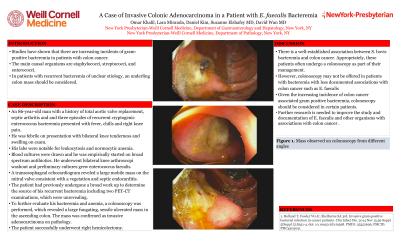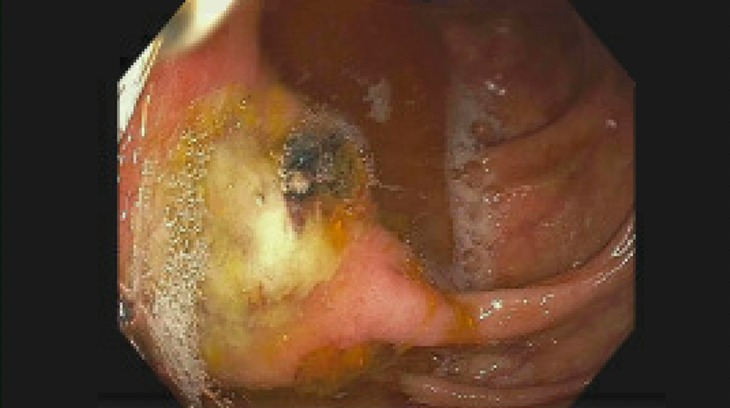Back


Poster Session D - Tuesday Morning
Category: Colorectal Cancer Prevention
D0182 - A Case of Invasive Colonic Adenocarcinoma in a Patient With E. faecalis Bacteremia
Tuesday, October 25, 2022
10:00 AM – 12:00 PM ET
Location: Crown Ballroom

Has Audio
- OK
Omar Khalil
Weill Cornell Medical College
Manhattan, New York
Presenting Author(s)
Omar Khalil, 1, Lara Miranda, 1, Daniel Kim, 1, Suzanne Elshafey, MD2, David Wan, MD3
1Weill Cornell Medical College, Manhattan, NY; 2New York Presbyterian-Weill Cornell Medical Center, Manhattan, NY; 3New York-Presbyterian Hospital/Weill Cornell Medicine, New York, NY
Introduction: Studies have shown that there are increasing incidents of gram-positive bacteremia in cancer patients. The main causal organisms are staphylococci, streptococci, and enterococci. There are multiple factors that contribute to the increasing gram-positive bacteremia and there should be more research in this area to decrease infection burdens on cancer patients.
Case Description/Methods: An 86-year-old man with a history of total aortic valve replacement, septic arthritis and recurrent enterococcus bacteremia presented with fever, chills and right knee pain. He was febrile on presentation with bilateral knee tenderness and swelling on exam. His labs were notable for leukocytosis and normocytic anemia. Blood cultures were drawn and he was empirically started on cefepime and vancomycin. He underwent bilateral knee aspiration and preliminary cultures grew enterococcus faecalis. To workup the source of his infection, a transesophageal echocardiogram was done that noted a mobile mass on the mitral valve. He also underwent a colonoscopy that found a large fungating sessile ulcerated mass in the ascending colon. The mass was biopsied with cold forceps for histology that was positive for invasive adenocarcinoma. The patient was admitted to manage his colon cancer and ultimately underwent a right hemicolectomy.
Discussion: There is a well-established association between S. bovis bacteremia and colon cancer. Appropriately, these patients often undergo a screening colonoscopy as part of their management. On the other hand, patients with E. faecalis bacteremia do not undergo this important screening as often because the association with colon cancer is not as well-documented for these patients. This is unfortunate given the increasing incidence of colon cancer associated with gram-positive bacteremia and increasing data blaming E. faecalis for the mutagenesis of colonic cells and progression to colon cancer. Therefore, it is vital to improve the study and documentation of E. faecalis-associated colon cancer and update the guidelines so that more patients with E. faecalis bacteremia benefit from potentially life-saving colon cancer screening.

Disclosures:
Omar Khalil, 1, Lara Miranda, 1, Daniel Kim, 1, Suzanne Elshafey, MD2, David Wan, MD3. D0182 - A Case of Invasive Colonic Adenocarcinoma in a Patient With E. faecalis Bacteremia, ACG 2022 Annual Scientific Meeting Abstracts. Charlotte, NC: American College of Gastroenterology.
1Weill Cornell Medical College, Manhattan, NY; 2New York Presbyterian-Weill Cornell Medical Center, Manhattan, NY; 3New York-Presbyterian Hospital/Weill Cornell Medicine, New York, NY
Introduction: Studies have shown that there are increasing incidents of gram-positive bacteremia in cancer patients. The main causal organisms are staphylococci, streptococci, and enterococci. There are multiple factors that contribute to the increasing gram-positive bacteremia and there should be more research in this area to decrease infection burdens on cancer patients.
Case Description/Methods: An 86-year-old man with a history of total aortic valve replacement, septic arthritis and recurrent enterococcus bacteremia presented with fever, chills and right knee pain. He was febrile on presentation with bilateral knee tenderness and swelling on exam. His labs were notable for leukocytosis and normocytic anemia. Blood cultures were drawn and he was empirically started on cefepime and vancomycin. He underwent bilateral knee aspiration and preliminary cultures grew enterococcus faecalis. To workup the source of his infection, a transesophageal echocardiogram was done that noted a mobile mass on the mitral valve. He also underwent a colonoscopy that found a large fungating sessile ulcerated mass in the ascending colon. The mass was biopsied with cold forceps for histology that was positive for invasive adenocarcinoma. The patient was admitted to manage his colon cancer and ultimately underwent a right hemicolectomy.
Discussion: There is a well-established association between S. bovis bacteremia and colon cancer. Appropriately, these patients often undergo a screening colonoscopy as part of their management. On the other hand, patients with E. faecalis bacteremia do not undergo this important screening as often because the association with colon cancer is not as well-documented for these patients. This is unfortunate given the increasing incidence of colon cancer associated with gram-positive bacteremia and increasing data blaming E. faecalis for the mutagenesis of colonic cells and progression to colon cancer. Therefore, it is vital to improve the study and documentation of E. faecalis-associated colon cancer and update the guidelines so that more patients with E. faecalis bacteremia benefit from potentially life-saving colon cancer screening.

Figure: Figure 1: mass observed on colonoscopy
Disclosures:
Omar Khalil indicated no relevant financial relationships.
Lara Miranda indicated no relevant financial relationships.
Daniel Kim indicated no relevant financial relationships.
Suzanne Elshafey indicated no relevant financial relationships.
David Wan indicated no relevant financial relationships.
Omar Khalil, 1, Lara Miranda, 1, Daniel Kim, 1, Suzanne Elshafey, MD2, David Wan, MD3. D0182 - A Case of Invasive Colonic Adenocarcinoma in a Patient With E. faecalis Bacteremia, ACG 2022 Annual Scientific Meeting Abstracts. Charlotte, NC: American College of Gastroenterology.
